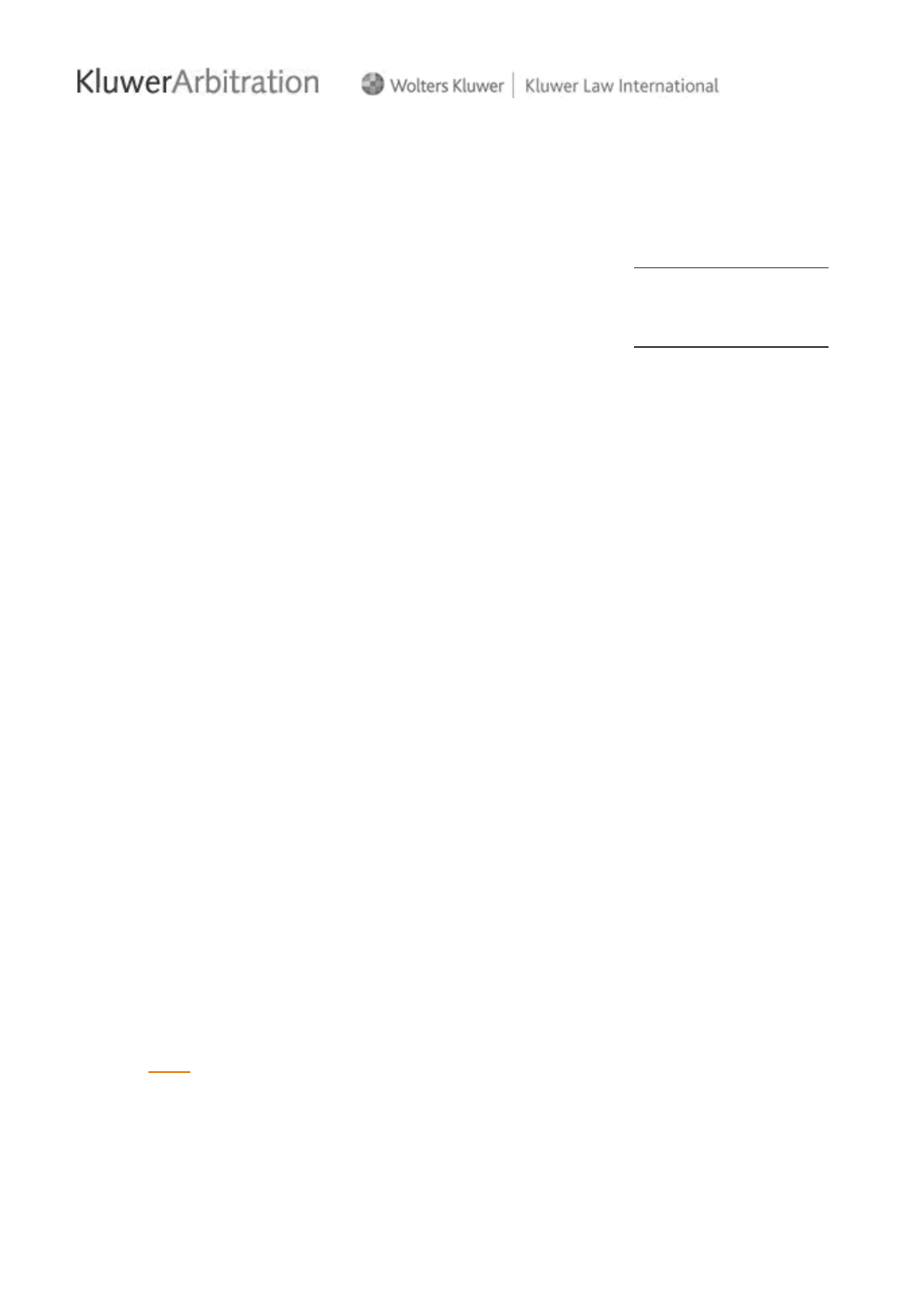
Author
RobertB.vonMehren
Source
RobertB.vonMehren,
BurdenofProofin
InternationalArbitration
inAlbertJanvanden
Berg(ed),Planning
EfficientArbitration
Proceedings:TheLaw
Applicablein
InternationalArbitration,
ICCACongressSeries,
Volume7Issue
(©KluwerLaw
International;Kluwer
LawInternational1996)
pp.123130
RobertB.vonMehren
(*)
I.Introduction
Ithasbecomethehallmarkofmoderninternationalcommercial
arbitrationthatarbitratorsareexpectedtobeneutraland
independent.Moreover,althougharbitralrulesplacethepowerto
decideinthearbitrator,theydonotconfereitherthepowerorthe
facilitiestogatherevidenceindependently.
(1)
Accordingly,the
arbitratorisexpectedtopresideinaneutralandevenhanded
fashionoveraproceedinginwhichthepartiesthemselvespresent
theevidenceuponwhichthearbitratorwillbasehisdecision.
Finally,inmostinternationalcommercialarbitrations,theawardof
thearbitratorisexpectedtoapplytothefactsasfoundbyhim.
(2)
Thus,theobligationswhichtheburdenofproofcreatesforthe
partiesbecomesacriticalpartofarbitralprocedure.Consideration
oftheproblemspresentedbytheburdenofproofisaninitial
questionwhichmustbemetinthedevelopmentofthestrategyto
beemployedinthearbitrationandintheplanningoftheparty's
presentationofthefacts.
II.WhatTruthdoestheArbitratorSeek?
Thearbitratormustorganizethearbitralproceedingsoastopermit
himtodeterminewhattherelevantfactsare.Ifheisproceeding
undertheICCRules,heisspecificallychargedbyArt.14“to
establishthefactsofthecasebyallappropriatemeans”.This
chargereflectsoneoftheessentialelementsofthetaskofan
arbitratorinproducingareasonedaward.Hemustdecide,onthe
basisoftheusuallyconflictingmaterialpresentedbytheparties,
whatthefactsrelevanttohisdecisionare.Hemustestablishthe
“truth”ofthematterbeforehimsothatit,togetherwiththe
applicablelegalprinciples,willproduceareasonedawardthat
decidesthecase.
(3)
page"123"
Anysystemofdisputeresolutionmusthavesomerulesorstructure
fordeterminingthetruthofthedisputebeingjudged.Theconceptof
theburdenofproofissucharule.Perhapstheneedforruleswith
respecttohowfactsaretobeestablishedislessimportantinan
inquisitorialsystemthaninanadversarialone.
(4)
However,
internationalcommercialarbitrationcannotfunctionasan
inquisition.SuchasystemrequiresthesupportoftheStatesothat
thejudgehasthefacilitiesavailablenecessarytogatherand
assessevidence.Anysuchsupportsystemisnecessarilylacking
inarbitrations.Thearbitraltribunalisthecreationoftheagreement
ofthepartiesandhaslittleornoaccesstothesovereignpowerof
BurdenofProofinInternational
Arbitration

theState.Asapracticalmatter,thetribunaldoesnothavethe
authorityorthefacilitiesavailabletoconduct–excepttoavery
limitedextent–itsowninquiryintothefacts.Asamatterof
necessity,itmustrelyonthepartiestogatherandpresentthe
evidence.Accordingly,ithasthesameneedforthestructureand
disciplinecreatedbytheprinciplesofburdenofproofasacommon
lawcourt.
The“BurdenofProof”containsthealphaandomegaoftheinquiry
intothefacts.Itimposesonthearbitratortworuleswhichcanbe
statedastwoquestions:“Whohastheburdenofgoingforward?”
and“Whohastheburdenofpersuasion?”Whichsidemust
introducethefactualinquiryintothearbitrationandwhichsidemust
presenttheevidencenecessarytoconvincethefinderoffactthat
itsversionoftheultimatefactistobeacceptedasthetruth?These
twoburdensfrequently,butnotalways,arebornebythesame
party.
III.TheBurdenofGoingForward
Generally,theburdenofgoingforwardrestsinitiallyontheparty
havingtheburdenofpersuasion.Thus,iftheclaimantassertsthat
therespondentbrokethecontractatissuebyfailingtoperforma
givenact,theclaimantwouldinitiallyhaveboththeburdenofgoing
forwardandtheburdenofpersuasion.Oncetheclaimanthasputin
aprimafaciecase,theburdenofgoingforwardshiftstothe
respondentwhomustrebuttheproofpresentedbytheclaimantor
facetheprospectofthisissuebeingdecidedagainsthim.
(5)
Theburdenofgoingforward,therefore,isaprinciplewhichrelates
towhenproofshouldbepresentedbyaparty.Itrestsessentiallyon
conceptsoflogicandorderlypresentation.Justasindebatewhere
theaffirmativespeaksfirstandthenegativesecond,theproponent
ofapositioninanarbitrationpresentsevidenceonthatpositionfirst
page"124" andthereaftertherespondentpresentshisproofin
rebuttal.Thesequenceofpresentationmaybetermedageneral
proceduralprinciple.
Itshouldbenoted,however,thattheburdenofgoingforwardcanbe
satisfiedwithoutactuallypresentingevidence.Forexample,itcan
besatisfiedbyapresumptionorbyanadmission;thesemethodsof
proofcanalsoinsomecircumstancesmeettheburdenof
persuasionaswell.
(6)
IV.TheBurdenofPersuasion
Thisburdenisuniversallyviewedbycommentatorsasbeingfixed
bytheissuespresentedinthecaseandbylegalprinciples.It
attachestoonepartyattheoutsetofthecaseanddoesnotshift.It
mustbemetbythepartythatbearsit,ifthatpartyistoprevailon
thatfactualissue.Arbitralrulesareforthemostpartsilentastothe
burdenofpersuasion.Art.24(1)oftheUNCITRALArbitrationRules
isanexceptionandprovides:“Eachpartyshallhavetheburdenof
provingthefactsreliedontosupporthisclaimordefense.”
Thisburdenisthusofcriticalimportance.Thearbitratorshould
applyitunlessheisfunctioningasanamiablecompositeur.In
application,twomajorissuesarise:First,whereisthestandardof
prooftobefoundand,second,whatisthecontentofthatstandard?
1.WhereIstheStandardtoBeFound?
Thisisaverydifficultquestion.Thevariousarbitralrulesgiveno

guidanceandthereareonlyafewhelpfularbitralawardsinthe
publicdomain.Certainpropositionsshouldbesetdownasa
foundationforourdiscussionofthequestion:
a. Thearbitratorderiveshisauthorityfromtheagreementofthe
parties.
b. Arbitrators,atleastincomplexinternationalcommercial
arbitrations,areusuallyskilledinreceivingandevaluating
evidence.Thesamestandardswhichapplytoajuryshouldnot
necessarilyapplytothem.
c. Subjecttotheprinciplesofequalityofthepartiesanddue
process,thearbitratorisforthemostpartfreeofrestrictive
rulesofevidencewhichapplyincourts.
Withthesepropositionsinmind,whereshouldthestandardbe
found?Thechoiceswouldseemtobeamongthefollowingthree
possibilities:
– Generalprinciplesoflaw–aconceptanalogoustolexmercatoria
– Thelawoftheplaceofarbitration.
– Thelawselectedbythepartiesorthearbitratorstocontrolthe
substanceoftheproceeding.
Eachofthesethreealternativesdeserveanalysis.Ishallconsider
thesecondandthirdalternativesfirst.
page"125"
a.Thelawoftheplaceofarbitration
Itusedtobethegeneralviewinmanyjurisdictions,including
England“thatarbitratorsareboundbythetechnicalrulesof
evidenceunlessthepartiesexpresslyorimpliedlyagreed
otherwise.”
(7)
Thisisprobablynolongerthecasewithrespectto
internationalarbitrations.Byandlarge,mattersofburdenofproof
andevidencearenotviewedtodayas“mandatory”rulesof
procedurewhichthearbitratormustfollow.
Consequently,thearbitratorisfreetoselectortorejectthe
proceduralrulesofthesitusunlessthepartieshavespecifically
agreedthatthoserulesshouldgovern.Anumberofconsiderations
militateagainstananalysiswhichrequiressuchachoice.First,the
choiceoftheplaceofarbitrationisoftenfortuitous,especiallyifthe
choiceismadebytheadministrativebody.Second,unlikethe
burdenofgoingforward,theburdenofpersuasionisbetterviewed
asamatterofsubstancethanprocedureandthusnotrequiredtobe
governedbythelawoftheforum.Itdoesnotconcerntheprocess
ofpresentingthecasebutratherthestandardofproofonwhichthe
ultimatedecisionwillrest.Thisstandardrepresentssuchan
importantconsiderationinthedecisionofthecasethatithasthe
qualityofsubstanceratherthanprocedure.
b.Thegoverninglaw
Howevertheburdenofpersuasionisclassified,therearestrong
considerationsinsupportofthepropositionthatthegoverninglaw
shouldattractthestandardofproofofitsjurisdiction.Theparties
haveeitherchosenbyagreementthecontrollinglaworthe
arbitrator,intheabsenceofchoicebytheparties,hasselectedthe
controllinglaw,usuallyonthebasisofthelawthathasthemost
contactsortheclosestconnectionwiththecase.Ifthegoverning
lawattractsthestandardofproof,thefactualaspectofthe

determinationofthedisputeismostcloselyassimilatedtothelegal
ruleswhicharebeingapplied.Thiswouldseemtoharmonizewith
thepresumedintentofthepartiesinchoosingthecontrollinglaw,
or,ifthatlawistobeselectedbythearbitrator,tobeconsistent
withtheapproachofapplyingthestandardofproofwhichhasthe
closestconnectionwiththecase.
c.Generalprinciplesoflaw
Ifthestandardofthegoverninglawisselected,anissuearisesas
towhen,ifever,thearbitratorcanproperlymodifythatstandardby
theapplicationofgeneralprinciples.Thisquestionmaybe
approachedbyconsideringahypotheticalcase.Assumethata
principalissueinaninternationalarbitrationisfraud;thatthe
arbitratorshaveconcludedthatthegoverninglawshouldattractthe
standardofproof;andthatthegoverninglawprovidesforahigher
standardofproofincivilcasesforfraudthanforotherissues.
(8)
page"126" Wouldtheapplicationofgeneralprinciplesjustifyan
arbitratorinaninternationalarbitrationapplyingtheusualcivil
standard?
Thisquestionturnsinlargemeasureonwhetherinarbitrationthe
sameresultsareexpectedanddesirableasinlitigation.Inlitigation,
whereahigherstandardisimposed,thejustificationcanprobably
befoundinnotionsofpublicpolicy.Sincefraudisinherently
criminal,thepublicpolicyargumentmightrunasfollowsina
commonlawjurisdiction:Theplaintiffinacivilcaseshouldbe
requiredtoproveitscaseagainstthedefendantbyastandard
whichiscloserthantheusualcivilstandardtothestandardof
“beyondareasonabledoubt”,whichtheStatewouldhavetomeetin
acriminalprosecution.Theclaimedimproperactsbeingclosertoa
criminalthanacivilwrong,thedefendantshouldhavetheprotection
ofthehigherstandardofproof.
Thishigherstandardofproofincivillitigationinvolvingfraudmaybe
justified,atleastincommonlawjurisdictions,bythejurysystem.
Certainlyitisthejurysystemwhichexplainstheapplicationof
manyrestrictiverulesgoverningtheadmissibilityofevidence.
Shouldthesamestandardbeappliedwherethetrialisbeforewhat
isusuallyapanelofsophisticatedandexperiencedarbitrators?The
tensionhere,itseemstome,isthedesiretoachievesimilarresults
injudicialandarbitralproceedings.Personally,Iamnotclearinmy
ownmindwhetherthatdesireshouldcontrolwhereoneormoreof
thefundamentalreasonsfortheexistenceofthestandardappliesin
litigationbutnotinarbitration.
2.WhatIstheStandard?
Thestandardmostgenerallyappliedininternationalcommercial
arbitrationisprobablythe“preponderanceofevidence”.This
standardreflectsthegeneralviewthattheproponentofaposition
mustdomorethancreateanequilibriumbetweenitspositionand
thatofitsopponenttoprevail.Somehow,theproponentmustpush
itsevidencebeyondthelineofequalweighttoaweightgreaterthan
thatoftheotherside.Thisapproachisconsistentwiththegeneral
viewthattheproponentofapositiondoesnotprevailunlessit
obtainssomeedgeoveritsopponent'sposition.Thus,thestandard
tiltsslightlyinfavorofthedefendantandreflectstherather
commonnotionthatthestatusquoshouldnotbechangedifthe
contendingpositionshaveequalstrength.
Thisstandardhasvariousformulations.Thegenerallyaccepted
Americanrulecanbefoundin3E.Devitt,C.Blackmar&M.Wolff,
FederalJuryPracticeandInstructions:CivilSect.72.01(4thed.

1987),whichdiscussesthefederaljuryinstructionontheburdenof
proof:
Theburdenisontheplaintiffinacivilaction…to
proveeveryessentialelementofhisclaimbya
preponderanceoftheevidence….
(….)
To‘establishbyapreponderanceoftheevidence’
meanstoprovethatsomethingismorelikelysothan
notso.Inotherwords,apreponderanceofthe
evidenceinthecasemeanssuchevidenceas,when
consideredandcomparedwiththatopposedtoit,has
moreconvincingforce,andproducesinyourminds
beliefthatwhatissoughttobeprovedismorelikely
truethannottrue.Thisruledoesnot, page
"127" ofcourse,requireprooftoanabsolutecertainty,
sinceprooftoanabsolutecertaintyisseldom
possibleinanycase.
Indeterminingwhetheranyfactinissuehasbeen
provedbyapreponderanceoftheevidenceinthe
case,thejurymay,unlessotherwiseinstructed,
considerthetestimonyofallwitnesses,regardlessof
whomayhavecalledthem,andallexhibitsreceived
inevidence,regardlessofwhomayhaveproduced
them.
Inotherjurisdictions,theideaof“preponderanceoftheevidence”is
formulatedintermssuchasthe“superiorweightofevidence”and
establishesthatitsversionofthefactsis“morelikelytruethannot
true”.
Inarecentimportantinternationalarbitration,leadcounselfora
partyarticulatedtheapplicablestandardasfollows:“Doesthe
evidencetestedagainsthumanexperienceandcommonsense
persuadeordoesitnot?”Thearbitraltribunalacceptedthis
formulationastheequivalentofthepreponderanceofevidencetest.
Fromthepointofviewofarbitration,thefundamentalprinciple
shouldbethatthestandardtobeappliedisthatprevailinginthe
jurisdictionfromwhichthecontrollinglawistaken.This,asnoted
above,
(9)
isconsistentwiththepresumedintentofthepartieswhere
theyhaveselectedthecontrollinglaw.Thearbitratormight,
however,deviatefromthehigherstandardwherehefindsthatthe
reasonswhichexplainitsuseinlitigationdonotapplytoarbitration.
3.WaysinWhichtheStandardCanBeMet–TheUseof
Presumptions
Theburdenofpersuasioncanbemetdirectlybydocumentary
evidenceandoraltestimony.Itcanalsobemetbyadmissionsof
thepartiesorthroughpresumptions.
Thequestionofpresumptionsisadifficultone
(10)
andonewhichthe
authorcouldonlyapproachwithintheframeworkofAmerican
practiceandauthority.Adetailedanalysisofpresumptionsis,
moreover,outsidethescopeofthispaper.However,ashortreview
confinedtoAmericanpracticeisusefultoexplainthetheoryof
presumptionsandhowtheyoperatewithintheframeworkofthe
burdenofproof.
Apresumptionisasubstituteforevidentiaryproof.Aclassical
example,oftenusedinAmericantreatises,isthepresumptionthat,

ifthepostingofaletterhasbeenproved,itsreceiptwillbe
presumed.
(11)
Theeffect,therefore,istosatisfytheburdenofgoing
forwardandtomeettheburdenofpersuasionastothefactof
receiptoftheletter.Theburdenofrebuttalisshiftedtotheother
partywhichmustintroduceevidencetoovercomethepresumption
ofreceipt.Sincetheburdenofpersuasioncannotbeshiftedand
remainswiththeproponentofreceipt,iftheevidenceofnonreceipt
persuadesthefinderoffact,theproponentofreceiptwillloseon
thisissueunlessitinturnsubmitsfurtherevidencetoshowreceipt.
Thepresumptionofreceiptsettlesthatissueunless page
"128" anduntiltheotherpartyputstheissueintocontentionby
submittingevidenceofnonreceipt.
Anotherexampleofpresumptionisthedoctrineofresipsaloquitur
(thethingspeaksforitself).Thisisappliedinthecommonlawto
manysituationsincludingthatofthebailee.Wheregoodshave
beencommittedtoabaileeandhavebeenlostorreturnedina
damagedcondition,thebaileeisliableforthedamagecausedbyits
negligence.Thebailorbyprovingtheundamagedconditionofthe
goodsupondeliverytothebaileeandthedamagedconditionupon
theirreturnbythebaileetriggersthepresumptionthatthedamage
hasbeencausedbythebailee'snegligence.Thisplacesuponthe
baileetheburdenofproducingevidenceofsomeothercauseofthe
damage.
(12)
Ininternationalcommercialarbitration,however,thepresumptionor
adverseinferencewhichismostoftenencounteredisthatinvokedif
aparty,knowntohaveadocumentinitspossessionorcontrol,
refusestoprovidethedocumenttothearbitraltribunal.
Unlikeacourt,thetribunalhasnosovereignpowertocompel
production.Itspowerislimitedtoitsuseofthefactofrefusalasa
factorinitsdecisionofthecase.Examplesoftheinternationaluse
ofthispresumptionoradverseinferencearefoundinthe
jurisprudenceoftheIranUnitedStatesClaimsTribunal.InWilliam
J.LevittandIslamicRepublicofIran,etal.,AwardNo.5202103,
para.6466,ChamberThreesummarizedthebasisforitsuse:
64.Basedontheforegoing,theTribunalfinds,as
foreshadowedbysomeofitsproductionOrders,that
theRespondentshavefailedtosubmitthemajorityof
thedocumentsrequestedandhavedonesowithout
supplyingadequatereasonsforthisfailure.Itbears
emphasisthattherequesteddocumentswereones
thattheyhadreferredtointheirownpleadings.Their
oftencontradictoryandevasiveexplanationssuggest
deliberatenoncomplianceratherthananinabilityto
produce.TheintroductionbytheRespondentsof
exhibitsnotpreviouslyfiledinsupportoftheir
counterclaimslendsfurthersupporttothissuggestion.
65.AsthisChamberdeterminedinArthurJ.Fritz&
Co.andSherkateTavonieSherkathayeSakhtemanie,
etal.,AwardNo.4262763,para.42(30June1989),
reprintedin22IranU.S.C.T.R.170,180,‘itisan
acceptedprinciplethatanadverseinferencemaybe
drawnfromaparty'sfailuretosubmitevidencelikely
tobeatitsdisposal.’There,theTribunalconcluded
thatitmusttakeintoaccounttheparty'sfailureto
produceordereddocumentsinweighingtheevidence
that page"129" wasbeforeit.SeealsoINA
CorporationandTheGovernmentoftheIslamic
RepublicofIran,AwardNo.1841611,p.14(13Aug.
1985),reprintedin8IranU.S.C.T.R.373,382.

66.Accordingly,whiletheTribunaldoesnotaccept
theClaimant'srequesttogranta‘defaultjudgment’,
theTribunalmustinterprettheincompleterecordwith
respecttotheclaimandthecounterclaimsinthelight
oftheRespondents'failuretocomplywiththe
Tribunal'sproductionOrders….
Theexistenceofthisnegativeinferenceanditsappropriateusein
internationalcommercialarbitrationareofgreatimportancetothe
properconductofsucharbitrations.Theinferenceprovidesa
sanctiontothetribunalthatis,atleastinpart,asubstituteforthe
powertocompelproduction.
V.Conclusion
Arbitration,asaprocessfortheresolutionofdisputesthrougha
neutralandimpartialinquiryintothefactsandthelawapplicableto
theparticulardisputebeforethearbitrator,requiresaframeworkfor
thepresentationofevidenceandtheresolutionofdisputedfactual
issues.Thisframeworkhasinlargemeasurebeendrawnfrom
judicialexperienceandhasbeenmodifiedinimportantrespects
particularlyinsofarastherulesofevidenceareconcerned.
Includedwithinthisframeworkisthesubjectofthispaper–the
“BurdenofProof”.Thisconcept,whichplaysacriticalroleinjudicial
proceedingsandisultimatelyrootedinlogicandcommonsense,
operatesinthefieldofarbitration.Ithastwobranches–onewhich
affectstheorderofpresentationofproofandonewhichgovernsthe
standardtobeappliedbythearbitratorinestablishingthefacts
uponwhichthefinalawardwillrest.Theseare,respectively,the
burdenofgoingforwardandtheburdenofpersuasion.Ofthese,the
latterisofthegreatersignificanceandessentialtotheprocessof
decisionmaking.
Theburdenofpersuasionshouldfollowthecontrollingsubstantive
lawwhetherthatlawhasbeenchosenbythepartiesorselectedby
thearbitrator.Itisappropriatetoattachthatburdentothegoverning
legalprinciplesunderwhichthedecisionofthearbitratorwillbe
reached.Sincemostarbitralawards,likemostjudicialdecisions,
decidemixedquestionsoffactandlaw,theassimilationofthe
principlesforfindingthefactstothoseforfindingthelawis
desirable.
Ininternationalcommercialarbitration,thepowerofthetribunalto
drawnegativeinferencesfromthefailureofapartytoproduce
evidenceinitspossessionorcontrolisapartialsubstituteforthe
powerofacourttorequiredocumentaryproductionfromparties
beforeit. page"130"
*
MemberoftheBaroftheStateofNewYork;OfCounselto
DebevoiseandPlimpton,NewYork;ViceChairman,International
LawAssociation;Member,ExecutiveCommitteeoftheBoardof
Directors,AmericanArbitrationAssociation;MemberoftheICC
InstituteofInternationalBusinessLawandPractice.
1
Thisgeneralpropositionissubjecttosomeexceptions,e.g.,the
arbitratormayhavethepowertoappointexpertsandtovisitthesite
ofimportantfacilities.
2
Ininternationalarbitrations,thedecisionofthearbitratoris
generallycontainedinareasonedawardwhichconsidersboththe
factsandtheapplicablelaw.Thearbitratormayactasanamiable

compositeur,ifthepartiesagreetogivehimthatpower.
3
The“truth”foundinbothjudicialandarbitralproceedingsis
relativeratherthanabsolute.Itisderivedfromtheevidence
presentedbythepartiesandisdependentuponthestandardof
proofappliedtotheevidence.Thus,thesameevidencecould
produceoneresultinacriminalcaseinacommonlawcountry
wherethestandardofproofis“beyondareasonabledoubt”anda
differentresultinacivilcasewherethestandardisthe
“preponderanceoftheevidence”.
4
Adistinctionhasoftenbeendrawnbetweenthecommonlawand
thecivillawjudicialsystems,theformerbeingcalledadversarial
andthelatterinquisitorial.Recently,thiscategorizationhasbeen
calledinquestionandithasbeennotedthattherearemany
similaritiesbetweenthetwosystems.See,ICCInstituteof
InternationalBusinessLawandPractice(Pub.No.440/8,1990),in
particular,M.DEBOISSESON,ComparativeIntroductiontothe
SystemsofProducingEvidenceinCommonLawCountriesand
CountriesofRomanLawTradition,pp.100etseq.
5
Ofcourse,ifthearbitratorconcludesthattheproofpresentedby
theclaimantdoesnotmeettheburdenofpersuasion,the
respondentwillprevailevenifheremainssilent.
6
SeeIV.3,infra.
7
J.STEYN,“England'sResponsetotheModelLawofArbitration”,
1993FreshfieldsArbitrationLecture,p.12,citingMUSTILLand
BOYD,CommercialArbitration,2nded.,p.352.ItisLordJustice
Steyn'spositionthatthisviewisnolongeraccepted.Seeid.atpp.
1215.
8
Insomejurisdictions,theruleisthatfraud“mustbeprovedto
existbyclearandconvincingevidenceamountingtomorethan
merepreponderance,andcannotbejustifiedbymerespeculation.”
Otherformulationsarethatfraudmustbeestablishedby“aclear
preponderanceoftheevidence”orby“clear,preciseandconvincing
evidence”.
9
SeeIV.1,supra.
10
See9WIGMORE,Evidence,Chapter89(Chadbournerev.
1981).
11
ThegeneraldeteriorationoftheUnitedStatesPostalSystemis
suchthatthispresumptionmaynotbevalidforthe1990's.Itdoes,
however,illustratetheprinciple.
12
ThefirstcasewhichIevertriedturnedonthedoctrineofres
ipsaloquitur.ItwasacaseintheSmallClaimsCourtfortheDistrict
ofColumbiainthespringof1948.IwasatthetimeaLawClerkto
JusticeStanleyF.ReedoftheSupremeCourtoftheUnitedStates.
TheplaintiffwasmyAuntwhohadhadapianomovedandwho
claimedthatithadbeendamagedinthecourseofmovingthrough
thenegligenceofthemovingcompany.Iputheronthestandand
examinedherontheconditionofthepianobeforedeliverytothe
truckingcompanyanduponreturntoher.Ithenputinevidenceon
thequantumofdamage,invokedthedoctrineofresipsaloquitur
andrested.Themovingcompanycouldnotexplainthecauseof
damageandthecourtreturnedajudgment(asmallone)inmy
Aunt'sfavor.
©2016KluwerLawInternationalBV(Allrightsreserved).
KluwerArbitrationismadeavailableforpersonaluseonly.Allcontentisprotectedbycopyrightand
otherintellectualpropertylaws.Nopartofthisserviceortheinformationcontainedhereinmaybe
reproducedortransmittedinanyformorbyanymeans,orusedforadvertisingorpromotional
purposes,generaldistribution,creatingnewcollectiveworks,orforresale,withoutpriorwritten
permissionofthepublisher.
Ifyouwouldliketoknowmoreaboutthisservice,visitwww.kluwerarbitration.comorcontactour

